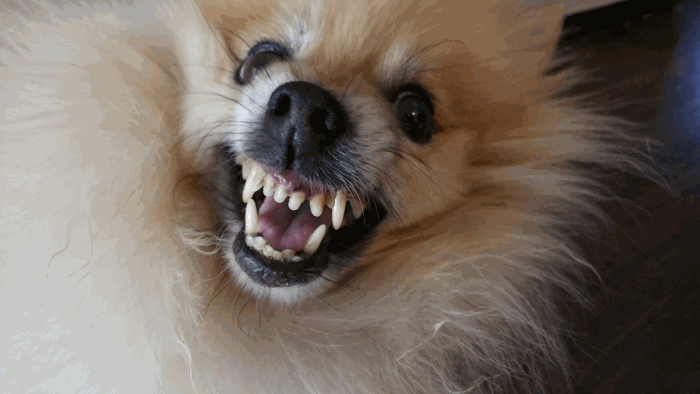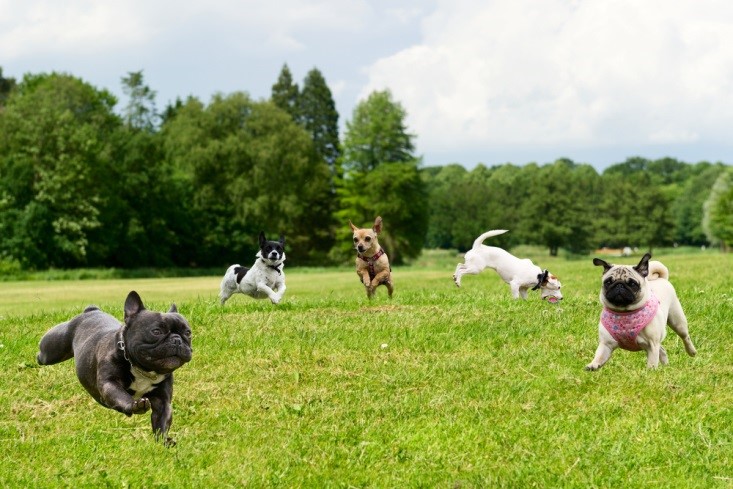Dog Behavioral Problems:Tips and Solutions to Common Canine Issues
By Janice A. Jones | Last Updated November 14, 2019
Dog behavioral problems are one of the many reasons people seek help with a dog trainer or animal behavior specialist.
Some are more serious than others. Some problems can be traced back to a genetics and normal canine behavior gone astray.
Others are caused by the environment, either through poor socialization as a puppy, trauma, or simply through owners who have unwittingly encouraged behaviors that eventually become problems.
 Dog Behavioral Problems
Dog Behavioral ProblemsUnless pet owners have been trained, the average dog owner may recognize the behavior problem but have little idea where the problem originated or how they can help their dog overcome or even eliminate the problem.
If you are one of those owners, relax, you are not alone. Most people misunderstand and mishandle their dog’s behaviors.
There are a number of common behavior problems seen in small dogs, some more serious than others.
What are the Most Common Dog Behavioral Problems
10. Excessively Energetic Dogs
11. Timid Dogs:
1. Aggression: Are small dogs more aggressive?
 Dog Behavior Problems
Dog Behavior ProblemsAggression in small dogs is one of those dog behavioral problems that is hard to ignore. It has many causes and comes in many different forms.
While there is plenty evidence to suggest a genetic cause, there is even more reason to believe that the environment might have something to do with dogs who are aggressive. Causes and types are discussed as well as some solutions.
Are small dogs more aggressive?
Read more about how to deal with an aggressive dog
2. Barking: How to quiet a yappy dog?
Almost all dogs bark, howl and whine but some small dogs are known for their yappiness.
Excessive barking is a dog behavioral problem — it is disruptive and annoying, both for you and for your
neighbors.
Read more about problem barking behavior
3. Begging: Why does my dog want to steal my food?
Begging is a bad habit, but many small breed dog owners unfortunately encourage it.
This can lead to digestive problems and obesity. Worse yet, it can undermine your role as pack leader.
Read more about how to stop begging at the table.
4. Digging: What can I do about my dog’s destructive digging habit?
If given the chance, most dogs will do some amount of digging, it is part of their instinct. Some dogs have been developed to dig burrows to look for rats and other vermin.
What happens when this activity involves digging a hole in your carpet or best rose garden? This is when digging becomes a big dog behavioral problem.
Read more about why dogs like to dig
5. Destructive Behavior: How can I make my dog stop destroying my furniture?
The good news is that you don’t have to put up with having your furniture in tatters.
There are some tactics that you can use to correct this behavior. If you are interested in finding out just how to curb your pup’s unfortunate habits, this is what you need to do.
Yes, sometimes it can seem like your small dog is gnawing on your furniture just to mess with you. Despite this, there is probably an underlying cause for this destructive behavior. Here are some of the most common culprits.
Read more about dog destructive behavior
6. Eating Their Own or Others’ Poop: Are there ways to stop this disguising habit?
This may be one of the most distasteful behaviors to observe or discover after the fact.
The technical term for eating one’s stool is coprophagia and the practice is more of a behavioral problem than a health problem, but there can be some health issues associated with the practice.
Read more about dogs who eat feces
7. Excitement Urination: Why does my dog do this?
 Excitement Urination is common in some puppies.
Excitement Urination is common in some puppies.Excitement Urination and Submissive Urination are two types of urination problems that I have seen sometimes in small dogs. Both are troublesome and discouraging, but there is hope.
While we may not be able to eliminate these problems entirely, we can at least understand why they are happening and what we should and should not do to improve the situation.
Read more about excitement urination
8. Licking: Why does my dog lick everything?
 Why do dogs lick everything?
Why do dogs lick everything?All dogs are a little crazy in their own way, but licking everything in sight is actually more common than you might think.
Carpets, toys, us, themselves – nothing is too dirty or too weird for their appetite, but should you be concerned?
Read more about licking
9. Submissive Urination: Why does my dog pee at my feet?

Inappropriate urination and defecation are among the most frustrating dog behaviors for their human families. They can damage areas of your home and make your dog unwelcome in public places or at the homes of others.
The little piddling that happens when a dog is trying to act submissive can be very annoying. Is there anything we can do about it?
Read more about submissive urination.
10. Super-Energetic Small Dogs: How can I calm them down?
 Calming Energetic Small Dogs
Calming Energetic Small DogsHaving more than their share of energy, some highly active small dogs need a little help from us to bring at exuberance down a notch or two.
Having plenty of energy is not a behavioral problem because most of the dogs that fit into this category were breed from the beginning to do a job requiring plenty of energy.
The problem comes when these dogs can not find ways to calm themselves and are working with a high level of adrenaline that can cause damage to the body.
Read more about calming energetic dogs
11. Timid Dogs: How do you train them?
 Training Timid Dogs: What You Must Know
Training Timid Dogs: What You Must KnowTimid dogs often present a huge training challenge. Some are born timid; others are made that way by abusive handling. As fear is the main reason dogs bite, there is no greater nature/nurture nightmare than a genetically timid dog who has been abused. This poor soul is an accident waiting to happen.
The clinically timid dog appears desperate, almost paranoid. This is the puppy in the litter who holds back. He’s the least likely to approach new people and may be reluctant to explore novel things. His fearfulness interferes with his enjoyment of life and, often, our enjoyment of him.
Read more about Training Timid Dogs
References and Further Reading on Dog Behavioral Problems
Karen Pryor: Ten Reasons Why Your Dog May Develop Behavioral Problems
Does This Article Deserve Your Thumbs Up?
We always appreciate your support and encouragement. Your thumbs up means so much to us.

Free Monthly Newsletter
Sign Up for Our Free Newsletter and get our Free Gift to You.
my E-book, The Top 10 Mistakes People Make When Choosing a Dog (and how to avoid them)
If you enjoyed this page, I’d love it if you’d let me know. Just click the button below. Thank you.
Sharing is Caring





canadian pharmacy ltd https://canadianpharm.pro/# canadian pharmacy 365
tor markets links dark web sites free dark web